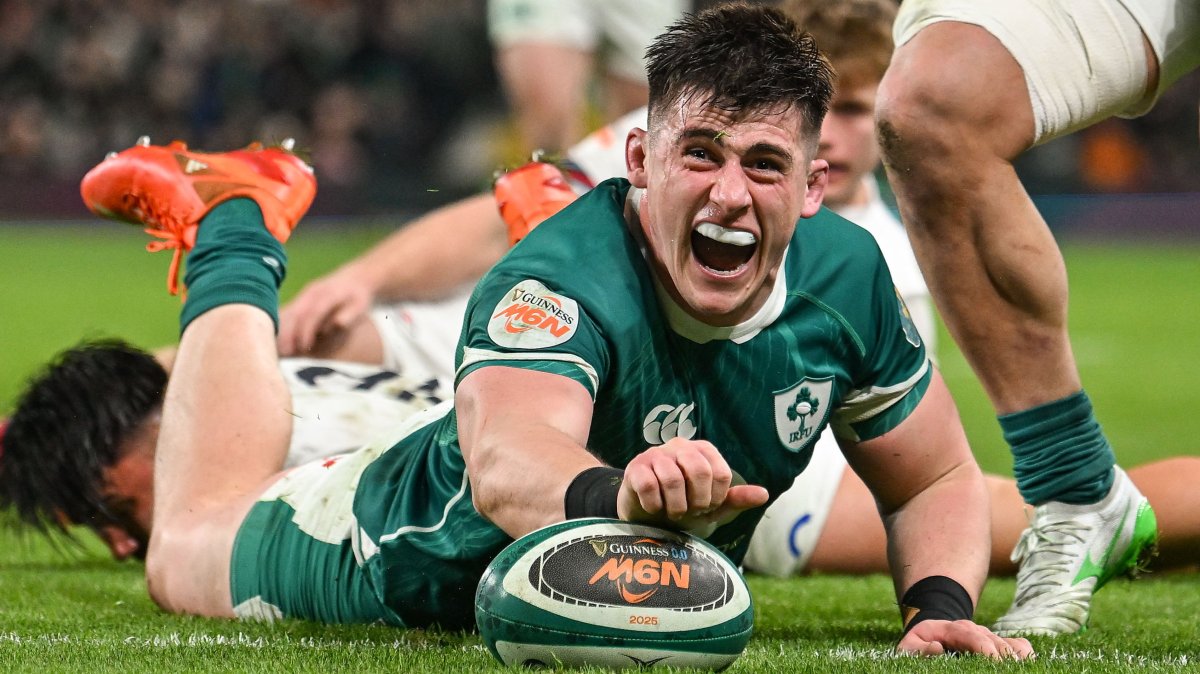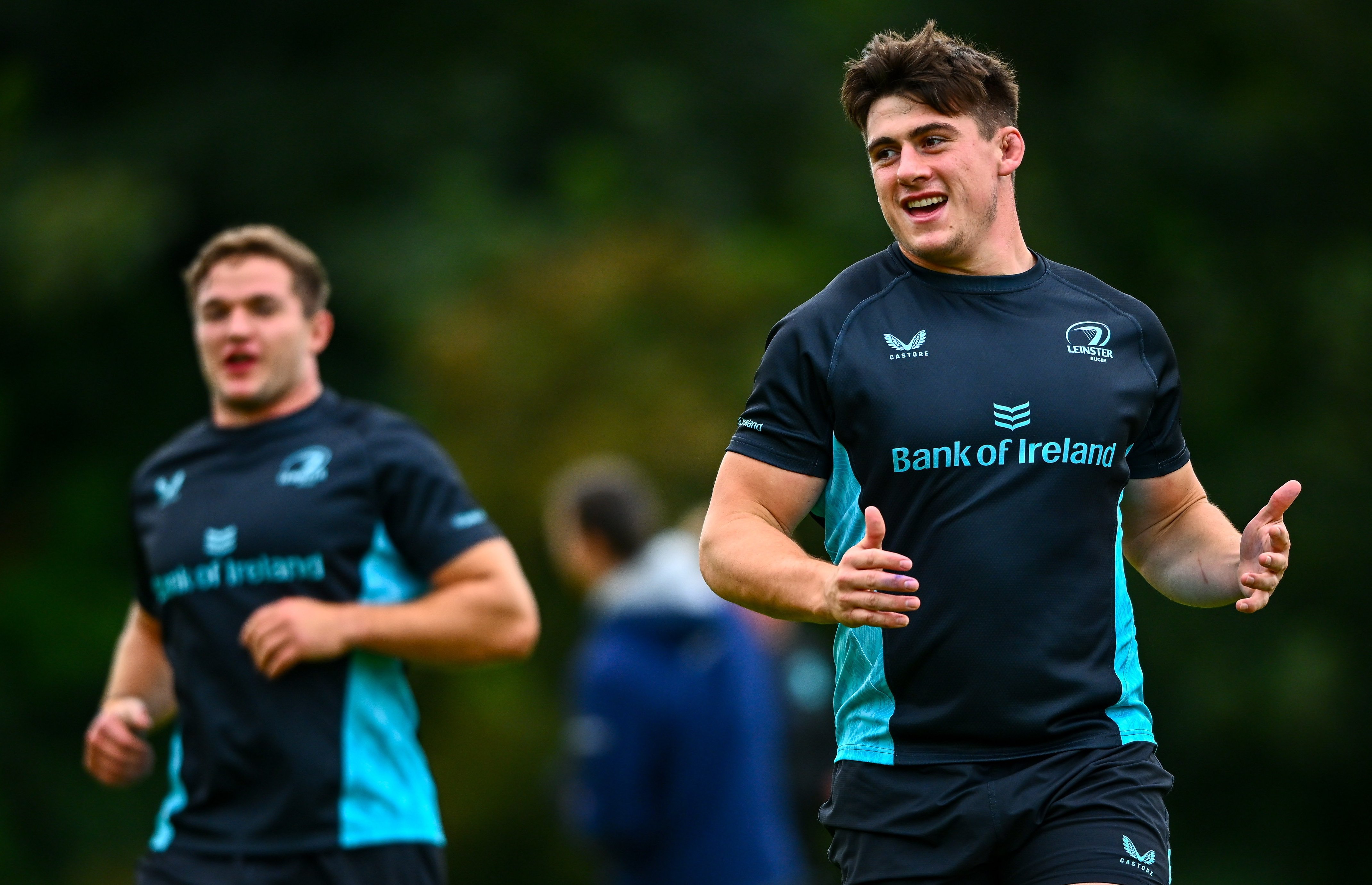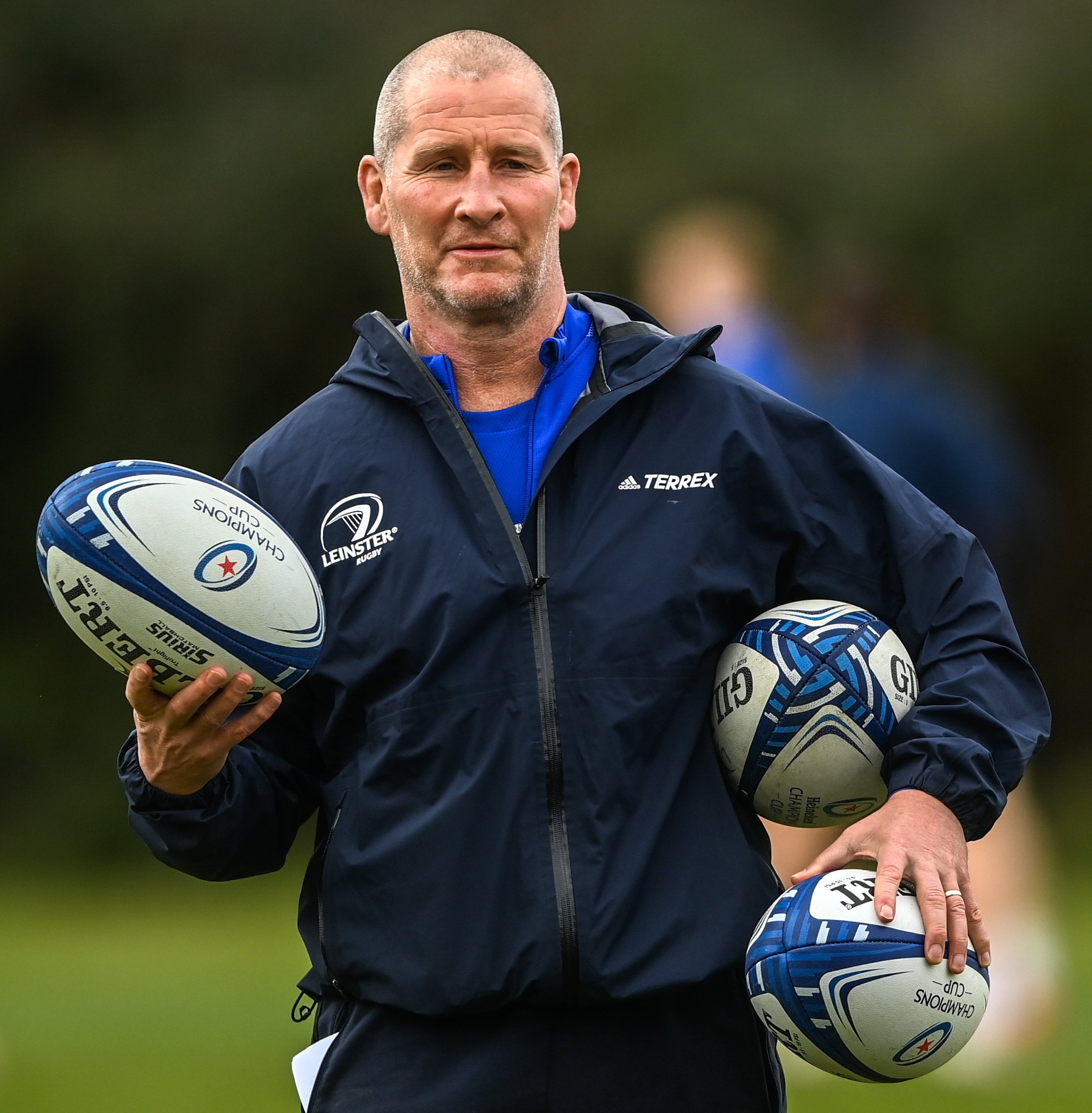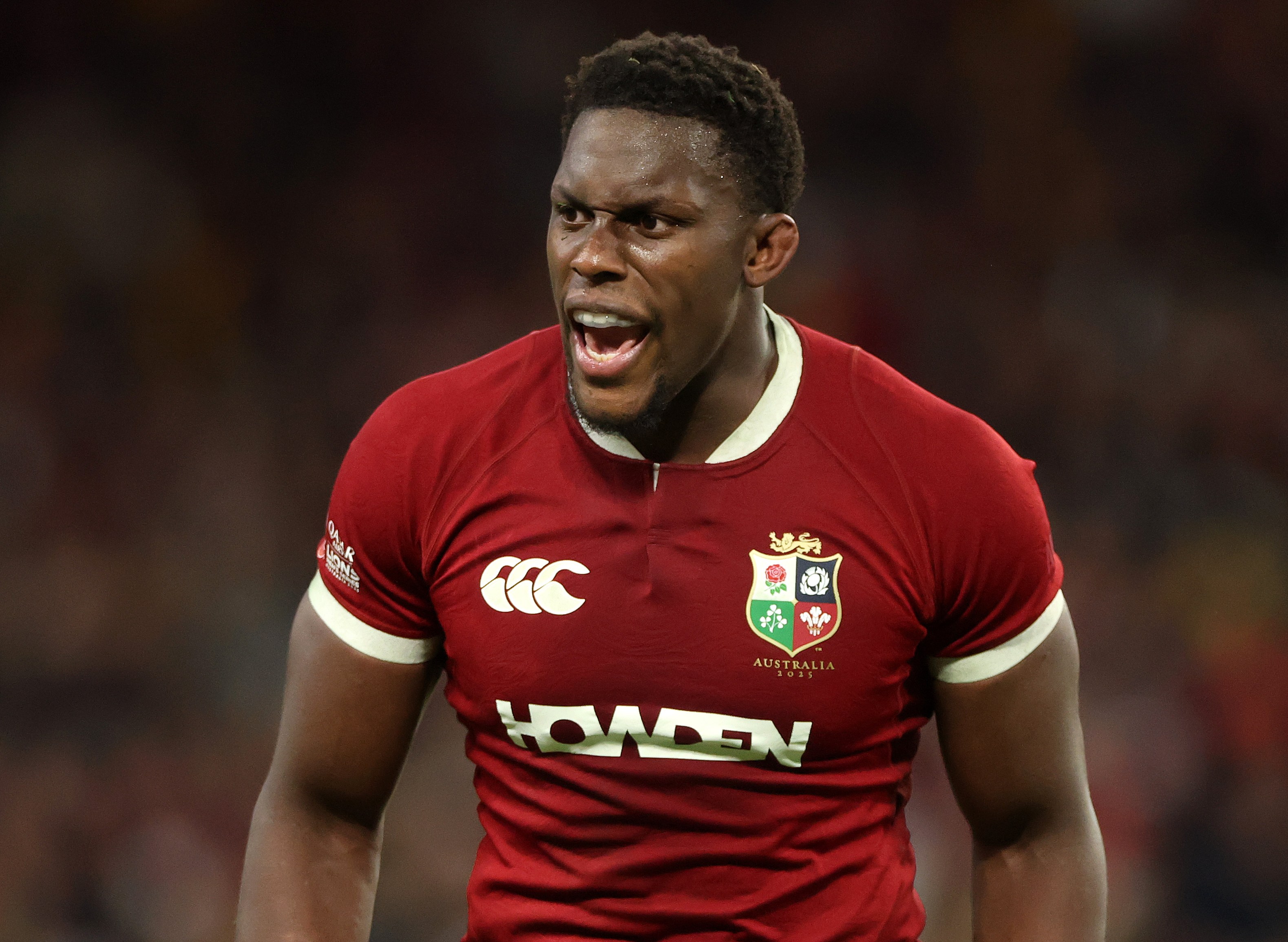Andy Farrell generally doesn’t get flustered but he must be a little panicky at the prospect of Ireland playing New Zealand in just under three weeks’ time. That’s Ireland who haven’t played at full strength since March against New Zealand who have just finished second in the Rugby Championship, only losing out to South Africa on points difference.
No wonder Farrell wants to get to Chicago in good time. The squad departs on Tuesday week, allowing for 11 days of intensive prep.
One detail the head coach can sort out pre-departure is the identity of his captain, seeing as Soldier Field looks like coming too soon for Caelan Doris, whose recovery from a shoulder injury is not quite complete. On the face of it, this comes down to a choice between Tadhg Beirne, captain at Munster and a world-class player but one who will be 35 come the 2027 World Cup, and Dan Sheehan — just turned 27 and someone who led Ireland against Wales in last season’s Six Nations.
Sheehan, right, and his Leinster team-mates face Munster at Croke Park this Saturday
SHAUNA CLINTON/SPORTSFILE
Here’s a clue: when Maro Itoje went off injured during the British & Irish Lions’ final Test against Australia in Sydney ten weeks ago, it was Sheehan who took over the captaincy.
Sheehan was wearing his club cap — literally — when we sat down with him last Tuesday. Leinster are looking to shift a few more tickets for next Saturday’s URC game against Munster at Croke Park and who better to shift them than the one Irishman who’d be guaranteed his spot in a World XV right now. He’s also a leader — perhaps not a born leader but someone who enjoys the role and who is confident enough to say so.
“Yeah, I’ve enjoyed it,” he says. “It doesn’t come naturally to me. It never did but with more experience, it becomes more comfortable. I feel like it focuses my mind during the week [of a game] and I’ve grown up a bit now in the squad. I can’t only be thinking about myself.
“I have too much experience now to be sort of inward-thinking. I need to be able to think about the group and where we’re at and what needs to be said in different environments. So it’s something that I need to build on. I’ve only captained four games and that just happens to be three different teams [Leinster, Ireland and the Lions]. But it’s something I enjoy and something I’m getting better at.”
Sheehan on the charge for the Lions against Australia in the final Test of last summer’s tour
ROBBIE STEPHENSON/PA
Just speaking confidently in public has been an acquired skill. The assured, easy-going Sheehan you see receiving man-of-the-match awards on TV is unrecognisable from the shy, self-contained teenager who dreaded the very idea of captaincy. But it was thrust on him in his final year at Clongowes.
“I hated every second of it,” he says. “Our captain Sean McCrohan was injured for a good chunk of pre-season and I had been named captain for the game we were playing that week. I’d be looking at lads and saying, ‘You speak here.’ Or I’d nod to one of my mates, ‘You need to speak in this huddle.’ I had that fear of stumbling over my words or whatever. I dunno, it was just something about growing up or being comfortable in your environment. It’s easier now.”
He can’t recall a precise moment when he found his voice but he knows that it was Stuart Lancaster who accelerated the search. During Lancaster’s seven years coaching at Leinster, he made it his business to transform so many passive and polite youngsters into leaders and communicators. With Sheehan, he had a job on his hands.
Not only was this youngster naturally quiet, he’d made his way into the Leinster academy as if by default — a late developer invited in as injury cover who blossomed in a high-performance habitat. Sheehan just couldn’t bring himself to pipe up in those squad meetings. He usually knew the answer that Lancaster was looking for but couldn’t bring himself to blurt it.
Eventually Lancaster took him aside. He recalls the specific conversation. “Yeah, it was before I had even played for Leinster,” Sheehan says. “I had just signed my first development contract and he pulled me into a room to ask, ‘Do you understand why we have signed you before you’ve even played a game?’ I was like, ‘I dunno.’ And he was like, ‘We see it in you. I don’t know if you see it in yourself but you need to be able to somehow grab hold of yourself now and take the opportunity you have.’
Lancaster, who was the Leinster coach for seven years, played a pivotal role in Sheehan’s development
HARRY MURPHY/SPORTSFILE
“I remember it was the first time someone had said, ‘I think you can go the whole way.’ And he wasn’t just talking about Leinster. He wasn’t talking about Ireland. He was talking about the Lions, and that was something that hadn’t even entered my head as a kid because I wouldn’t have allowed myself to think I was capable of doing that. I was just a shy kid. That was the first thing that opened my eyes and made me think, ‘Maybe get out of your own head and f***ing give it a go.’ Stuart would have definitely had a big impact on me breaking down walls a little bit and getting more confident.”
Sheehan is now more vocal in meetings and in the changing room but he will never be a tub-thumper. High emotion can drain energy in the build-up to a Test match, so there is no longer any ranting about putting the fear of God into your opponents. At least there isn’t in Irish changing rooms — which is why Sheehan was surprised to observe how Itoje and Ellis Genge went about their business before the Lions Test matches in Australia.
“I found it fascinating how we get pumped up for games is very different to countries like England,” he says. “There were a lot of passionate speeches and shouting in changing rooms, which we weren’t used to. As a group, we’re quite calculated and process driven and just trust that we’ve done the prep in the week.
“So that was something that initially shocked me. Even Maro. He’d be stomping around the changing room and giving it socks and we’re all a bit rattled because usually it’s pretty quiet in our changing room until we come together at the last second, but at every opportunity they’re trying to get riled up and get passionate.
“Genge and Maro would have been the two most vocal, which works. It gets you passionate, like. I remember we came out firing in that first Test. It’s just not something we would have done previously. We would never have been taught to go searching for that. It can almost be a bit of a distraction sometimes and you lose focus on the small habits and processes. I’d just be about getting on with it and doing your job. But different people, different things.”
Itoje’s noisy approach to firing up his Lions team-mates came as a surprise to Sheehan in Australia
DAVID ROGERS/GETTY IMAGES
Sheehan recognises that he has a very different personality to some of the leaders he has admired, like Peter O’Mahony and Johnny Sexton. His more phlegmatic approach can have its benefits, however. It is easier to deal with referees at stressful moments in a contest. You’re less likely to suffer the doubts that can afflict lineout throwers.
“I’ve never seen the point in dwelling on things,” he says. “One of my big traits is that I can drop things behind me and just get on with it. It’s down to my sort of mellow nature. I probably learnt how to take that ‘in your shell’ child with me in some ways and not just completely leave him behind.”
I suggest to him that his quiet self-reliance may have something to do with his slightly unconventional route into pro rugby, which saw him missing out on most representative age-grade squads. Did the recurring need to justify himself give him mental fortitude?
He says: “Either that, or it could be a very big weight on people’s shoulders when they’re labelled coming out of school: He’s the next thing. You see it all the time. They end up not making it or they fall out of love with the game or it all becomes a bit too much if they don’t become what they want to be. It’s a hard place for a young fella.
“For me, sort of hiding bushes in the background for a while was a good thing. I just worked away and enjoyed playing rugby. There was never a week when I didn’t want to go training. I just needed a little push, not to be happy sitting in the back of the room. But yeah, it probably did help that I wasn’t the big star coming out of school. That can be quite taxing on lads.”
Life for Sheehan seems less than taxing right now. He stayed in Sydney for a few days after the final Lions’ Test, then spent time with family and friends in Ballyconneely, County Galway — “probably my favourite place in the world”. He has recently bought a house in Dublin.
He seems happy in his own skin. Dealing with the media comes easily to him and that’s probably because the only media training he received was from his dad, Barry, who told him: ‘Just be yourself.’
“It’s a walk in the park,” he says, smiling. “I’ve been lucky in that I’ve never been put in a tough situation. They’re not the hardest questions to answer, for the most part!”
He can already predict one of the questions he might have to answer in Chicago: the one about Ireland’s rustiness, their shortage of preparation for a particularly taxing November: New Zealand, Japan, Australia, South Africa.
“Again, what can I do?” he says. “I just play the game and get on with it and no excuses and rock up and just do your best in training. Obviously those lads [New Zealand] are coming off the back of a lot of rugby, and have been in camps for months, whereas we’re hitting into a big game in Croke Park next week and, you know, we’ll have to prove that we can get to the level pretty quick.
“It’s good to have that game — a big interpro derby. Those are the sort of games that have a similar feel to a Test game where you can kind of test where you’re at. There’s always a bit more pressure or just hype in the squad around the game. So just get on with it.”
Spoken like a proper leader.
Leinster v Munster
URC, Croke Park
Kick-off Saturday 5.15pm
TV Premier Sport, TG4




